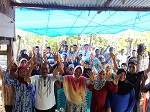News
Tuesday, May 9, 2017

The Fisheries and Marine Institute (MI) of Memorial University is part of a four-year, multi-partner project that is aiming to strengthen the aquaculture industry in Indonesia.
INVEST Co-op Indonesia is one part of a four-country program designed to improve the livelihoods of small farm producers in Indonesia, Malawi, Mongolia and Peru. The goal is to increase production, productivity and access to markets and financial services through integrated production, financing and marketing co-operatives. In Indonesia, the project aims to strengthen the position of small scale aquaculture producers of seaweed, milkfish and shrimp (SMS) in four regencies in South Sulawesi (Takalar, Jeneponto, Bantaeng and North Luwu).
Supportive Collaboration
MI’s International Office and School of Fisheries are working in partnership with the Canadian Co-operative Association (CCA) and local Indonesian organizations, Kospermindo (Koperasi Serikat Pekerja Merdeka Indonesia) and LP3M (Lembaga Pengkajian Pedesaan, Pantai dan Masyarakat) to implement the project.
“As an organization with expertise in international development and the aquaculture sector, MI was brought into the project team to share technical advice and deliver sector specific workshops with the project’s field coordinators and local farmers,” said MacKenzie Young, International Program Officer at MI International and the MI Project Coordinator for INVEST Co-op Indonesia. “There are a number of challenges in the Indonesian aquaculture industry and MI is focused on helping to enhance the economic well-being for women and men small aquaculture producers. The approach of the project is to build capacity through a train the trainer method to promote a long term, sustainable impact.”
INVEST Co-op Indonesia will introduce aquaculture practices that are not only resilient to climate change, but also increase quality and yield of production. Support will also be provided to farmers to improve access to financial services and markets through their co-operatives. By training the co-operatives in the seven basic principles (in alignment with the International Co-operative Alliance ICA), the project aims to enable co-operatives to be sustainable, profitable and run gender-equitable businesses by strengthening their institutional capacity to serve their members better. In addition, activities will promote collaboration with governments, private companies, business associations, research institutions, and other stakeholders to strengthen networks and create a conducive environment for co-operatives to provide better livelihoods to farmers.
“MI understands the value of sustainable aquaculture to a region and we look forward to working with Indonesian farmers to strengthen their capabilities,” said Cyr Couturier, Senior Technical Expert on the Project, Aquaculture Scientist and Chair of Aquaculture Programs at Memorial University. “Our experts will provide technical assistance on good aquaculture practices, food safety and quality, waste management, market access and value addition, certification, and climate change and adaptation.”
Aquaculture Experience
Aquaculture has been identified as an important social and economic priority by the United Nations and MI has been focused on the industry for many years at a national and international level. Through MI International, MI has completed more than 250 projects in over 50 countries, of which several were focused on the aquaculture sector. To support the work in Indonesia, representatives from MI will be on the ground periodically throughout the project to support the enhancement of farmer’s growing practices, improve the quality of their products and help them eventually diversify to more valuable products.
“We’ll be hosting practical workshops, with the goal of reaching up to 10,000 beneficiaries,” continued Mr. Couturier. “An added benefit of the program is that we will conduct some basic research on improving production systems for seaweed, shrimp and milkfish.”
The team will also establish two demonstration farms in partnership with local seaweed farmers to evaluate new culture techniques and processes.
“We are very fortunate to be involved in this exciting initiative with such dedicated partners,” continued Ms. Young. “The project will provide opportunities for growth not only within the communities and co-operatives, but also in our project team.”
INVEST Co-op Program
The INVEST Co-op Program is a four-year, CAD$22,135,773 initiative funded by the Canadian Department of Foreign Affairs, Trade and Development (GAC) with a $5,042,417 contribution from the Canadian Co-operative Association (CCA). The Ultimate Outcome of the project is improved sustainable, gender equitable economic well-being for women and men small producers through co-operatives in Indonesia, Malawi, Mongolia, and Peru. The INVEST Co-op Indonesia project is valued at CAD$2.7 million.





